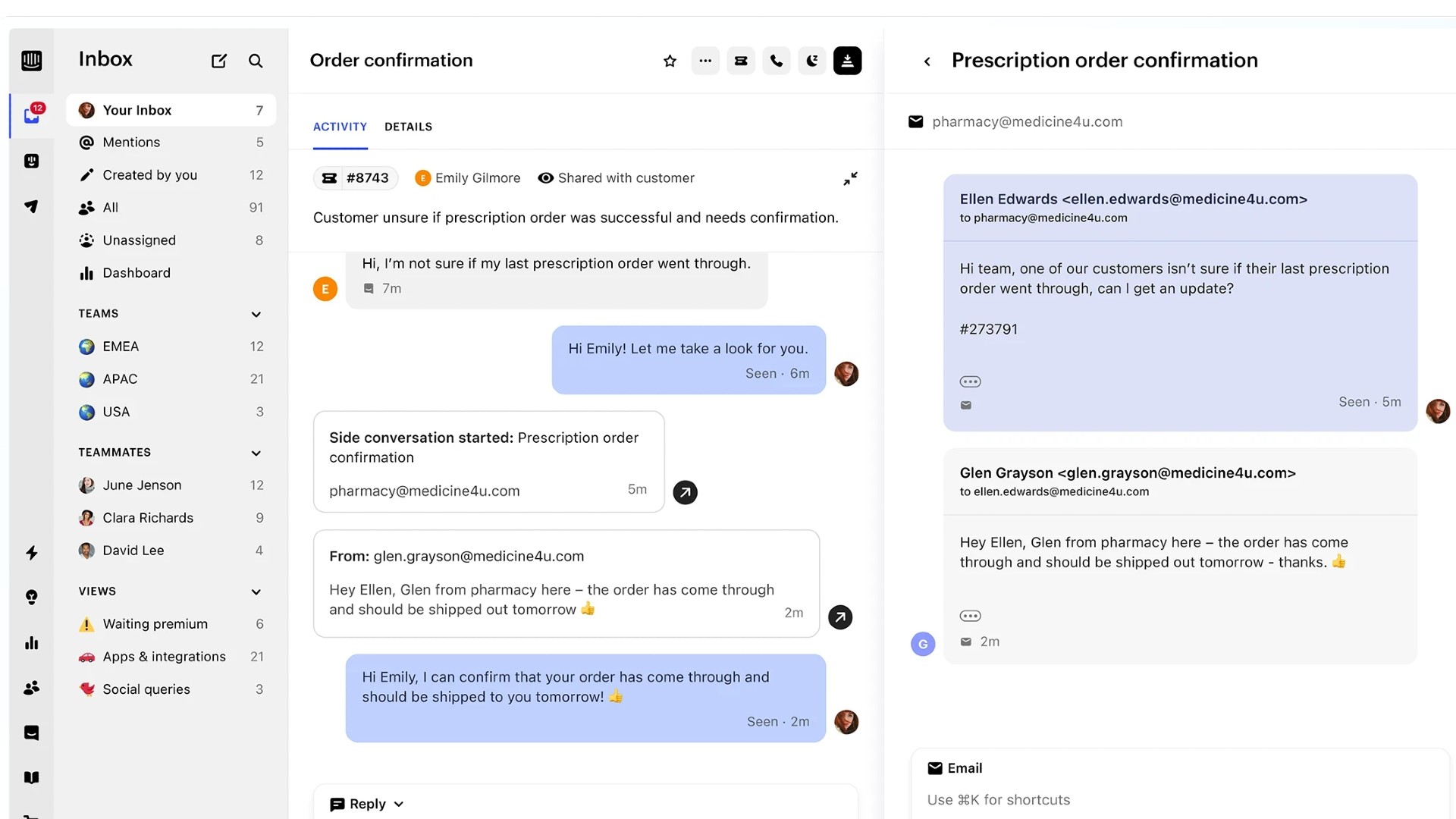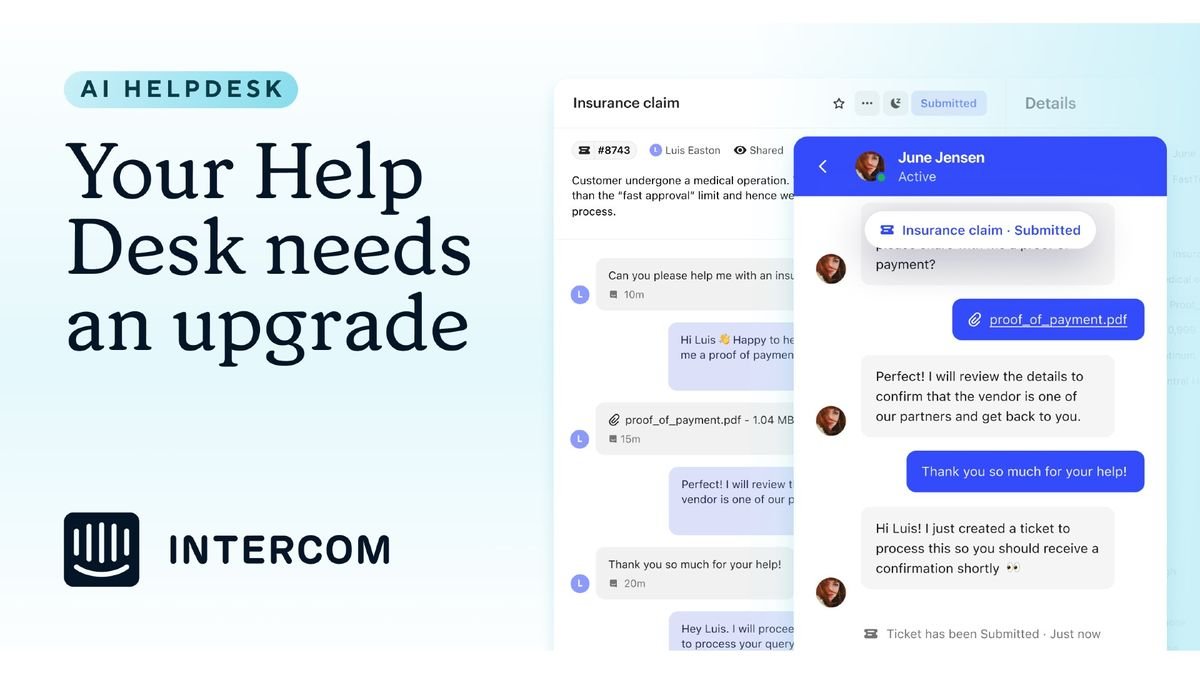In this Intercom review, we outline exactly why this is one of the best helpdesk software solutions on the market today – a feature-rich option with a host of integration options, which is a letdown a little by a higher-than-average price tag.
No business can survive for long without some sort of customer support. Things go wrong and customers encounter challenges. It’s at these points that businesses depend on reliable support options, whether it’s a dedicated piece of live chat software or a helpdesk tool like Intercom.
If your brand has booted for the latter, then you could do a lot worse than Intercom. This is an app that focuses on dynamic real-time communication, promising to connect your company’s inbox, tickets, and help center into one central, AI-enhanced workspace. In this sense, it’s not only great for improving your customer service but also for enhancing the productivity of your support team.
In fact, now seems like a good time to mention Intercom’s AI capabilities. The platform comes with a Fin AI feature that can automatically summarize conversations in your inbox, personalize your replies, and autofill the relevant ticket information. This ensures Intercom stands out as one of the best AI tools in the helpdesk space.
It must be said, however, that Intercom is not one of the cheaper helpdesk programs currently available. This means it could be prohibitively expensive for smaller businesses – especially if they want to access some of the most advanced functionality on offer here – as these are often locked away for the exclusive use of more premium customers.
Having said all that, it’s worth checking out Intercom if your company is looking for a new helpdesk solution. This is an increasingly competitive space, especially with the rise of AI chatbots and other automated tools. Give Intercom a try and it could take your customer service to new heights.
Let’s address one of Intercom’s less-pleasing features right away – its price. This isn’t one of the cheapest helpdesk tools on the market, with plans starting at $39 per seat, per month for the Essential plan. This is the sort of customer support plan that might be suitable for individuals, startups, and small businesses but is unlikely to meet the needs of a multinational enterprise.
Moving up the pay scale, you’ll find the Advanced plan, which costs $99 per seat, per month. This comes with some additional automation tools and AI features for growing support teams. You’ll gain access to multiple team inboxes, workflows for advanced automation, Fin AI, and a multilingual help center.
For businesses with larger budgets, meanwhile, there’s the Expert plan, which will set customers back $139 per seat, per month. In addition to all the features you get from the Essential and Advanced plans, you also receive time management functionality, Fin AI Compose, and multiple help centers.
Features

As mentioned, the features that Intercom customers have access to can vary significantly depending on the pricing tier they’re signed up to. All users will enjoy the platform’s inbox view, however, which comes with AI functionality throughout. They’ll find conversations from every channel, including email, phone, and messenger, that can be viewed directly to their inbox to enable faster prioritization and resolution.
In terms of the ticketing process, support agents can use Intercom to resolve complex issues more efficiently with each ticket designed to streamline collaboration. The way ticketing works with Intercom is designed to ensure conversations can continue within the same platform. There’s no need to change tools, so the likelihood of things being forgotten or miscommunicated is minimized.
Other features include detailed reporting. For support leaders, Intercom offers them the opportunity to monitor, analyze and optimize their service using AI functionality. They have access to real-time performance data and customizable reports so whatever standard their support operations are at currently, they can always improve them.
When discussing Intercom’s features, it’s also worth drilling down into its Fin AI functionality in greater detail. The Fin AI Agent helps with the resolution of customer queries using conversational answers. It boasts a customizable setup and is self-improving so you should see your resolution rates improve with time. Fin AI also uses a variety of different content sources to come up with its AI-generated answers, including external content like public URLs, your personal intercom help center, PDF files, and more.
For subscribers to the Expert plan, there’s also Fin AI Compose, which can re-write your replies in your unique tone of voice based on your previous responses. Collectively all the features that make up Intercom’s Fin AI Copilot are already showing that they can make a significant difference to a company’s helpdesk offering. On average, Fin AI increases agent efficiency by as much as 31%.
Integrations
As with many other digital tools, integrations play an important role for Intercom. Digital transformation has been adopted widely in many organizations, so to ensure workplace silos don’t develop, many solutions connect seamlessly with other third-party tools. A look at any of the best CRM software solutions or cloud storage offerings illustrates that integrations are essential in the modern business world. Fortunately, this is an area where Intercom performs well.
The Intercom app store hosts more than 300 pre-built apps, making integration with many of the most popular business solutions seamless. This includes several apps for marketing like Mailchimp, Google Analytics, and Typeform. Connecting with these apps helps Intercom users create more positive customer experiences, boosting loyalty.
Other Intercom integrations include several that are specifically geared toward optimizing sales. Applications, such as Salesforce, HubSpot, and Pipedrive, all straightforwardly with Intercom so every part of the sales process covered by your CRM is closely aligned with your help desk.
Intercom also offers users the chance of creating their own custom integration, using its unique API. This enables customers to seamlessly integrate Intercom with their own product, tech stack, or other tools. This adds a layer of customization that you don’t see with many other helpdesk solutions.
Interface and ease of use
While Intercom’s bespoke interface isn’t bad by any means, the platform’s UI really shines in terms of customization options. In the platform’s Help Center Settings, a number of different customization options are displayed, which means you can design how it looks and operates to better suit the needs of your support team and customers. Any changes you decide to make to the UI can also be previewed before they are implemented.
Intercom has also taken care to ensure it is equally accessible to mobile users, by making it easy for them to include their Help Center directly in their mobile app. In order to do so, users have to first install the latest version of the Intercom mobile SDK. This means that, whichever presentation method you use to present your help content, customers won’t have to leave your mobile app.
Although Intercom’s UI may look great, it’s not been universally praised for ease of use. Some have complained of a somewhat steep learning curve, but this shouldn’t put you off. The Intercom website does offer webinars, guides, and other resources so if you do encounter any difficulties, you will hopefully be able to resolve them.
Support
Of course, you would assume that any help desk solution would come with its own robust support package. After all, “help” is front-and-center for what they do. With Intercom, one of the best places to start for assistance is the Intercom Community page. This lets users connect with customers, partners, developers and other members of the Intercom team to resolve any issue. There’s a product Q&A, a range of user tips, and several groups you can join to help with more bespoke challenges.
There’s also an Intercom Academy to provide additional support across several topics. For instance, the academy can help users get started with Fin AI, learning how the platform can automate repetitive tasks, and many other potential issues. There’s even the option of making your Intercom knowledge official through certification.
Security
Intercom promotes its security credentials through membership of a number of different groups and an impressive list of credentials. This includes adherence to Service Organization Controls (Soc2) (Type II) Trust Services Principles, being a member of the Cloud Security Alliance, and compliance with ISO 27001:2022 Certification.
In addition, all of Intercom’s infrastructure and data are spread across three AWS availability zones, which provides the necessary failover to guarantee continuity of service even if one of those data centers fails. All data sent by Intercom is also encrypted in transit using 256-bit encryption.
The competition
The helpdesk and livechat software space is becoming increasingly competitive, with Zendesk, Tidio, and many others providing support for customers. Although Intercom may compare unfavorably with some of these in terms of cost, most premium subscriptions do deliver a large range of functionality for the money. Ultimately, whether Intercom is with the price will depend on your needs and budget.
Not many other helpdesk software solutions will offer the same degree of AI integration as Intercom. This ensures this is a platform that not only looks the part today but which is likely to remain relevant for a number of years yet.







